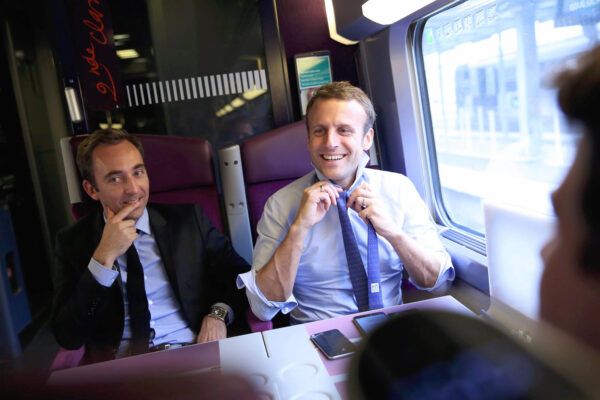
For once, the French are spoilt for choice.
Their presidential elections used to be a battle for the center between the mainstream left and the mainstream right. Now there are five candidates with a reasonable chance of qualifying for the second voting round in May, including a big-government socialist, a small-government conservative, a nationalist of the left and a nationalist of the right.
Our sympathies lie with the fifth man in the middle: Emmanuel Macron. Comfortable with neither the statist inclinations of the Socialist Party nor the social conservatism of the Republicans, he launched his own progressive movement last year for the rejuvenation of France. It represents the best alternative to the anti-globalism of Jean-Luc Mélenchon and Marine Le Pen.
Need for reform
France is desperate for reform. Polls have consistently found majorities in favor of deregulation, scrapping the 35-hour workweek and bringing public-sector pensions in line with those in the private sector (which would mean cuts for the former).
The Socialist Party is too beholden to public-sector interests and trade unions to deliver. Macron discovered this when he served as François Hollande’s economy minister from 2014 to 2016. He enacted reforms that would have been uncontroversial in most countries: allowing small firms to opt out of collective bargaining agreements, expanding shopping hours and liberalizing intercity transport. But they were an affront to the old left.
Hollande constantly vacillated between reform and the need to appease his base — and ended up satisfying no one.
Unemployment is still at 10 percent and the Socialist Party is split. Neither Hollande nor his reformist prime minister, Manuel Valls, could win this year’s nomination. Benoît Hamon, a far-left idealist, prevailed in the primary. He has ceded the center ground to Macron and competes with Mélenchon for the support of left-wing voters.
Yesterday’s solutions
Whereas the Socialists have yet to come to terms with Macron’s reforms, the right-wing François Fillon proposes to go further. Perhaps too far. It is one thing to argue for a gradual retrenchment of the French state, as Macron does; it is another to propose firing hundreds of thousands of civil servants in a single term.
Fillon cites Margaret Thatcher as an inspiration, but the problems France faces are not the same as the United Kingdom did in the 1980s.
Inflation is low. Unemployment is high by European standards but not at dangerous levels. Unions can still paralyze the Socialist Party but not the country.
Fillon’s policies are solutions to yesterday’s problems. He has little to say about the economic challenges of today: how to manage the gig economy; how to reduce youth unemployment; how to shrink the “blue-red” gap between worldly college graduates on the one hand, who embrace globalization, and lower-skilled and small-town voters on the other, who feel the ground is falling out from underneath their feet.
Protectionism
Macron, Mélenchon and Le Pen have something to say about these issues.
The last two believe the answer lies in protectionism. In a globalized economy, they argue France must raise trade barriers. In a dangerous world, they argue France must take care of itself.
Hamon imitates Mélenchon’s economic program with his call for a universal basic income. To his credit, he resists the far left’s Russophilia and anti-Europeanism. But given Hamon’s fifth place in the polls, center-left voters risk an undesirable Mélenchon-Le Pen or even a Fillon-Le Pen runoff if they don’t back Macron.
Fillon mimics Le Pen’s identity politics in calling for a reintroduction of military service and school uniforms. He also opposed marriage equality and argues against lifting the ban on medically assisted procreation for gay couples.
This is not France’s future. Center-right voters with relaxed social views would be better off voting for Macron.
A proud France
Macron doesn’t have all the answers either, but he has ideas: from extending social insurance to the self-employed to shifting the wealth tax to property to expanding defense and energy cooperation in Europe.
His vision isn’t radical, but nor is it timid. He rejects the instinct to turn inward and champions a France that regains the confidence and the competitiveness to lead Europe in a true partnership with Germany.
Europe needs that leadership. France needs the confidence and the competitiveness.
After a progression of presidents who did little more than manage their nation’s elegant decline, the French have a chance to elect somebody with the energy and the independence to move them forward again. We encourage them to take that chance.
